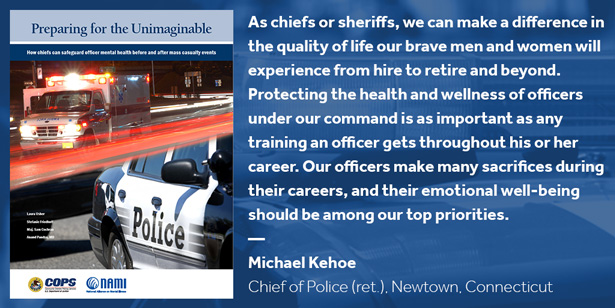
“Ensuring the mental wellness and health of first responders has long been an underappreciated task for the heads of police agencies. U.S. law enforcement has learned from tragic events over the years and now trains to respond to threats with the best equipment and practices known today. However, many chiefs are not prepared to deal effectively with the intense scope and unanticipated duration of the aftermath of these events, and many chiefs are unaware of the impact such events will have on their communities and the officers in their agencies.”
–Michael Kehoe, Chief of Police (ret.), Newtown, Connecticut
In 2013, the U.S. Department of Justice’s Office of Community Oriented Policing Services reached out to NAMI to provide assistance to the Newtown (Conn.) Police Department in the aftermath of the Sandy Hook Elementary School shooting. Chief Kehoe asked NAMI to write a guidebook for chiefs on how to safeguard officer mental health in the early days after a mass casualty event. He said that events like Sandy Hook rewrite the rules—for dealing with the media, for coordinating with other agencies, and for officer mental health. His hope was that other chiefs would benefit from the lessons he learned.
With Chief Kehoe’s leadership, NAMI convened an expert advisory group of police chiefs who had experienced mass casualty events in their communities, along with the mental health professionals who advised them, to gather lessons learned and guidance for other chiefs. NAMI also sought guidance from numerous police leaders, mental health professionals, and trauma and media experts. The result is this guide, which educates chiefs about officer mental wellness, provides steps to preparing for the mental health impact of a mass casualty incident, and walks chiefs through the crisis and the aftermath.
While the lessons shared in this guide focus on mass casualty events, traumatic experiences are an everyday event for police officers. Responding to car accidents, homicides, child abuse, domestic violence, and other negative events are part of the job. Personal accounts in the guide make clear that these incidents can build up and lead to mental health problems like depression, PTSD, alcohol abuse and even suicide.
While events like Sandy Hook have raised awareness of the challenges that officers face, the day-to-day impact of police work is much greater. Fortunately, there are many steps that law enforcement leaders can take now to build resilient agencies, whether or not they ever experience a mass casualty incident. There are also ways to prepare for the possibility of such an incident. This guide can serve as a resource for agencies interested in getting started.
NAMI HelpLine is available M-F, 10 a.m. – 10 p.m. ET. Call 800-950-6264,
text “NAMI” to 62640, or chat online. In a crisis, call or text 988 (24/7).